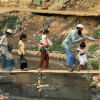Prevent a repeat of Rohingya atrocities

We are deeply concerned that the United Nations has stated the Myanmar conflict is becoming so volatile that the atrocities of 2017 may be repeated against the Rohingyas. The UN human rights chief Volker Turk expressed concern on Friday, saying that the situation across Myanmar, particularly in Rakhine, has sharply deteriorated recently. Additionally, reports suggest that hundreds of civilians have been killed while trying to flee the fighting.
Exactly seven years ago today, the second phase of the Rohingya genocide had started. It is estimated that between August 25 and September 24, 2017, at least 6,700 Rohingya were killed. Despite the Myanmar government dismissing these findings as exaggerations, the UN found evidence of widespread human rights violations, including extrajudicial killings, summary executions, gang rapes, the arson of Rohingya villages, businesses and schools, among other horrific atrocities. Currently, a case is ongoing at the International Court of Justice (ICJ), accusing Myanmar of abetting genocide against the Rohingya ethnic group.
Following the events of 2017, an estimated 750,000 Rohingyas fled from Myanmar into Bangladesh and took shelter in various refugee camps. Despite repeated dialogues between Myanmar and Bangladesh for the safe repatriation of these Rohingyas back to their homeland, we have seen little to no progress made over the years. With clashes between the Arakan Army and Myanmar's ruling junta worsening, the possibility of further destabilisation in the region due to the ongoing situation in Myanmar seems to be rising rapidly.
Reportedly, thousands of Rohingyas have already been forced to flee again on foot, with the Arakan Army herding them repeatedly into locations that offer scant safe haven. Finding themselves trapped between the military and its allies and the Arakan Army, many of them are again looking to cross into Bangladesh. Given that Bangladesh is already overwhelmed with its own issues, as well as struggling to continue providing support to the Rohingya that had earlier sought shelter within its territories, the influx of even more Rohingya into Bangladesh could prove disastrous.
The burden of supporting the Rohingya—on humanitarian grounds, and rightly so—has been massive on Bangladesh. As such, we invite the international community to be more active in solving the Myanmar crisis so that this burden can be lifted and the region can regain some of its lost stability. We hope that every influential member of the international community, including the collective West, China and India, will urgently respond to this call.

 For all latest news, follow The Daily Star's Google News channel.
For all latest news, follow The Daily Star's Google News channel. 










Comments